
Wild Wednesday: Rideau Valley Wildlife Sanctuary is not foxing around when it comes to wildlife rescue
No one gives more fox about wildlife than the incredible folks who work in wildlife conservation! The team at Rideau Valley Wildlife Sanctuary have an especially soft (and furry) spot for foxes right now. They are caring for three rescued fox pups and these babies are turning up the cute!
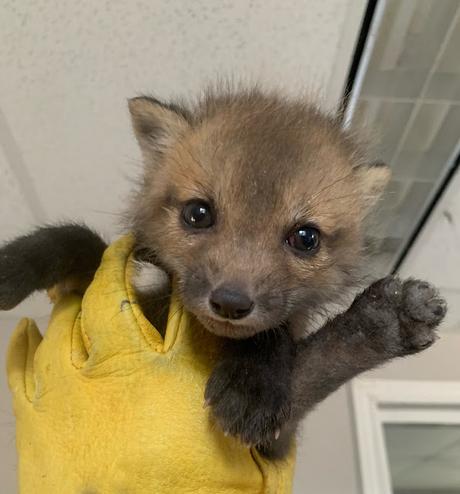
Photos of the fox pups provided by Rideau Valley Wildlife Sanctuary
Rescuing, rehabilitating, and rewilding animals is a challenging job. It's rewarding too, but that reward comes after long days and nights, physical labour, dirty jobs, and unrelenting compassion. I commend wildlife rescuers for their ability not to get attached to the animals they work with. Many of the animals are infants and ALL of them are adorable. Folks who rewild animals have big hearts, but they understand that certain species shouldn't become accustomed to human contact. I learned that from Linda Laurus, Executive Director forRideau Valley Wildlife Sanctuary when she shared some exciting news: the sanctuary rescued three red fox pups!
The pups- two males and one female- are not officially named. Special care is taken to ensure attachments aren't formed between the foxes and the sanctuary team. It's not just to make sure the people don't get attached to the pups- after all, they are irresistibly cute, as you can see. This decision is made in the best interest of the pups.
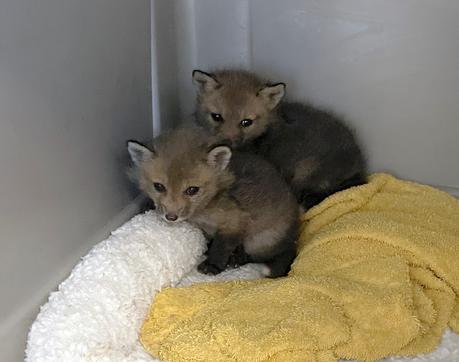
"We had to take special steps to make sure the pups did not become accustomed to people. We have to keep them wild and fearful of humans so they do not become nuisance animals when released," Linda said. "So we limited the number of people who cared for them to supervisors only, who fed them twice a day and only handled them when needed. We were able to monitor them through a one-way viewing window and video feed."
A fox pup video feed! That's thinking outside the fox! I'm picturing a fox pup Zoom meeting: three pups and a sanctuary supervisor saying "You're on mute..."
Orphaned animals are common in wildlife sanctuaries. Finding a potentially abandoned baby animal can be distressing for us regular folks. It's hard to determine the right action to take. Rideau Valley Wildlife Sanctuary's commitment to educating the community in these situations is impressive. Their website contains a fox den full of information about coexisting with wildlife, including advice to help you make the right decision if you find a baby animal! Whether you are in the Ottawa area or not, you can consult their website to find answers to your orphaned wildlife questions. Some articles are even species-specific!
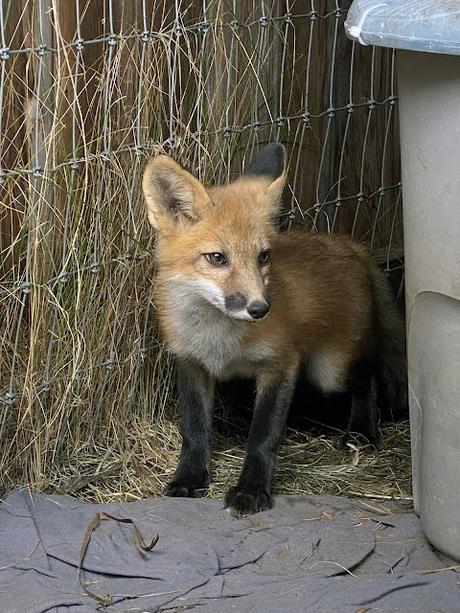
So how did the fox pups find their way to the Rideau Valley team? Linda shared their origin story with me.
"A family in a rural area near Ottawa felt lucky to be able to watch a fox family that was denning under their shed. They watched as the parents came and went and babies began emerging from the den, exploring and playing under the watchful eye of their mom."
What began as an exciting and rare opportunity to observe the foxes turned concerning.
"One day, the parents stopped coming back, so the homeowner thought they had moved on. But a few days later, two pups emerged on their own and ran towards the family’s dogs," Linda said.

The fox family was lucky to be under the watchful eye of the homeowner, who reached out to the Rideau Valley Wildlife Sanctuary team for guidance.
"After we spoke with them, we determined that the pups had been orphaned and alone for 3-4 days," said Linda. "Some species, like orphaned foxes, raccoons and squirrels, will approach people and pets- sometimes even cars- looking for help."
They rescued two pups- one male and one female. Weeks later, they rescued the third fox pup, another male, younger than the first two. In orphaned infants the risks of injury or illness increase. They explore their habitat without the instinctual knowledge and care their parents provide. They are distressed and can be easy prey. The Rideau Valley team must work quickly to provide medical care to the animals they take in- this care can be expensive and is funded primarily by donations. This was the case with the fox pups.
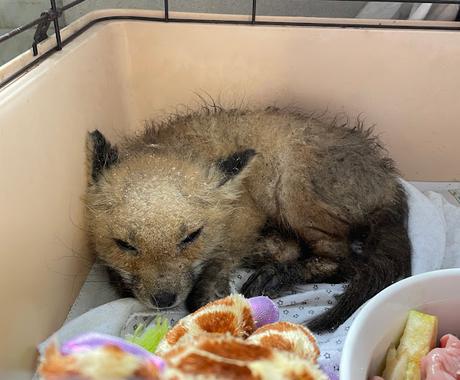
"Having been alone for 3-4 days, the pups were dehydrated and emaciated. They also had mange, a skin mite, that causes extreme itching, hair loss and anemia," said Linda. "We gave the pups injectable fluids three times a day for 2-3 days. They received injectable medication to treat mange once a week for four weeks. At first, their diet consisted of watered-down formula and canned dog food. Once they were hydrated, they received full strength formula, canned food, and other proteins such as raw meat."
Sarcoptic mange is something pet owners may be familiar with. Mange mites are less common in companion animals than in wildlife, but it happens. If left untreated it can cause serious damage. Scabies is a human mite that is closely related to sarcoptic mange. While many mange mites prefer specific hosts, it's common for mange mites to be zoonotic- passed from animals to humans- adding additional risk to handling the animal. Silver fox lining: mange is treatable!
"The first treatment kills the mites within 12-24 hours, so they feel much better right away. The subsequent treatments kill any hatching mites," Linda said.
The third pup rescued was in worse shape than the first two. The mange was so severe it caused a thick crust to form on his skin, hindering his ability to see. He received the same treatment as the other pups but needed around-the-clock care for the first few days, to stabilize him.
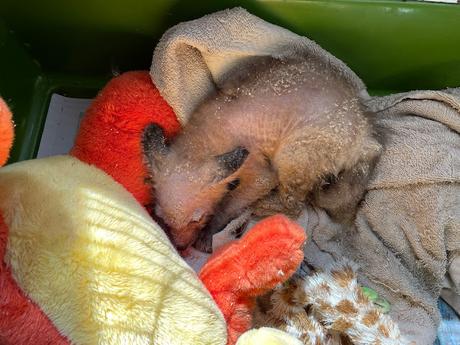
"Because the mange was so severe, he lost his entire coat of fur and required a heating pad. Although he was younger than the other two, he came from the same general area so we were able to put them together once his fur started to grow back in," said Linda.
Their goal is to rewild the foxes- rehabilitate and release them into the wild when they're able to survive on their own. They are confident this can be done with the pups and the planned release date is late summer or early fall.
"We only needed to handle the foxes weekly to weigh and medicate them. By then, they were already fearful of us humans and catching them once a week reinforced that. Once they were old enough, we transferred them to an 8x16’ outdoor enclosure," Linda said. "A week later we let them out into the attached 32x64’ naturalized pen. In there, their own instincts kick in. They dig dens and tunnels, climb rocks and ledges, and run and play. While we still feed them daily, they are able to catch their own prey; prey that makes it into the enclosure, like small rodents."
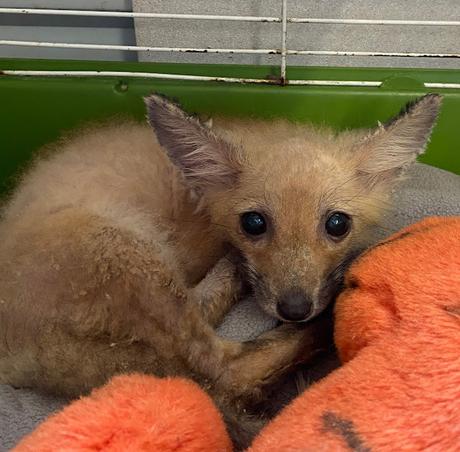
Our community is fortunate to have Rideau Valley Wildlife Sanctuary! Their team provides care for animals in need in all the right ways and supports biodiversity, playing a critical role in ensuring a healthier and more sustainable planet. Thank you for your hard work and dedication to wildlife! We acknowledge the role you play and appreciate each and every member of your team.
Please help support the fox pups by making a donation to Rideau Valley Wildlife Sanctuary! There are many ways to give, including via PayPal, etransfer, and CanadaHelps. The sanctuary needs items and supplies too- check out their wishlist to learn more. Specific fundraising for the fox pups will begin in the fall- sign up for the Rideau Valley newsletter for updates! You can follow the foxes' story by liking the Rideau Valley Wildlife Sanctuary on Facebook and Instagram and following them on Twitter.
Check out other Wild Wednesday posts!
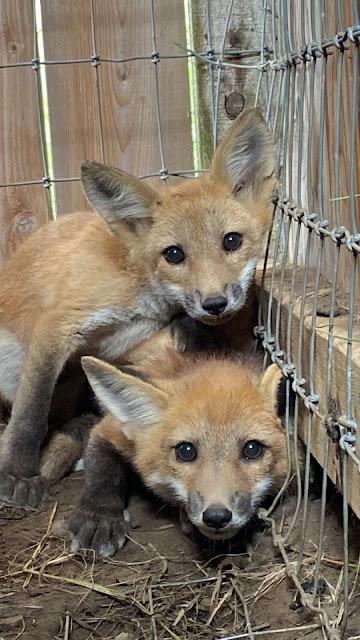
Like Paws for Reaction on Facebook
Follow @PawsForReaction on Twitter
Follow @PawsForReaction on Instagram
Follow my blog and subscribe in the sidebar >>
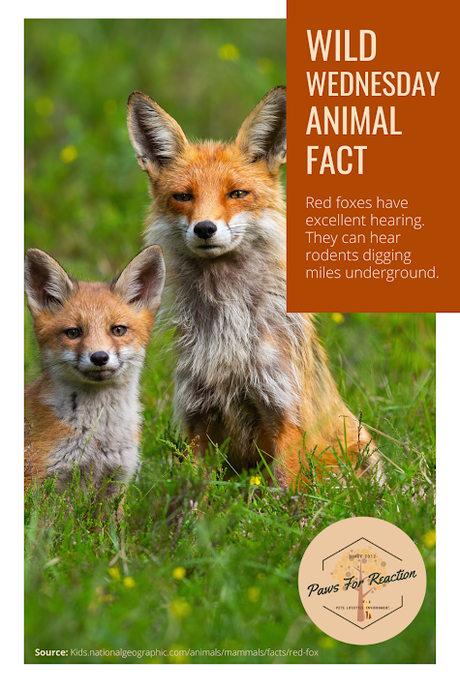
#WildWednesday
